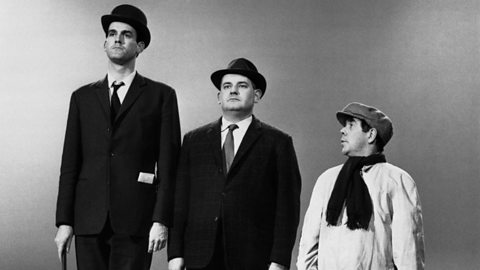Class in An Inspector Calls

Before World War Two, Britain was divided by class. Two such classes were the wealthy land and factory owners and the poor workers. The war helped bring these two classes closer together and rationing meant that people of all classes were eating and even dressing the same. The war effort also meant that people from all classes were mixing together. This was certainly not the case before.
Priestley wanted to highlight that inequality between the classes still existed and that the upper-classes looked down upon the working-class in post-war Britain.
Class is a key theme in An Inspector Calls.
How is this shown in the play?
In An Inspector Calls, Priestley explores the theme of class through the treatment of working-class Eva Smith by the wealthy Birlings and Gerald Croft when she is in the following situations:
- when she is a factory worker
- when she works in a shop
- when she is effectively homeless
- when she is potentially a single mother
| How does Priestley show this? | Evidence | Analysis | |
| Mr Birling's opinion of the working class. | When Mr Birling discusses how he sacked Eva Smith after she had gone on strike. | "If you don’t come down sharply on some of these people, they’d soon be asking for the earth." | Mr Birling feels that it is his responsibility to come down 'sharply' on 'these people'. Priestley wanted the audience to realise that this is the wrong attitude to have, we should be looking after 'these people' not punishing them. |
| The behaviour of the Birlings' friends. | When Gerald tells the Birlings about the behaviour of Joe Meggarty. | "He's a notorious womaniser as well as being one of the worst sots and rogues in Brumley." | Joe Meggarty is an 'Alderman' or a council member. The rest of the family is shocked to hear that he is a 'sot' (another word for a drunk), and a womaniser. Much to the Birlings' surprise, their upper-class friends can behave badly. |
| Mrs Birling’s opinion of the working class | When Mrs Birling is discussing the moment when Eva approached her charity. | "As if a girl of that sort would ever refuse money!" | Mrs Birling refers to Eva Smith as a 'girl of that sort'. She clearly has preconceptions about working-class girls suggesting that they lack morals and will always take money. |
| Mr Birling's opinion of the working class. | |
|---|---|
| How does Priestley show this? | When Mr Birling discusses how he sacked Eva Smith after she had gone on strike. |
| Evidence | "If you don’t come down sharply on some of these people, they’d soon be asking for the earth." |
| Analysis | Mr Birling feels that it is his responsibility to come down 'sharply' on 'these people'. Priestley wanted the audience to realise that this is the wrong attitude to have, we should be looking after 'these people' not punishing them. |
| The behaviour of the Birlings' friends. | |
|---|---|
| How does Priestley show this? | When Gerald tells the Birlings about the behaviour of Joe Meggarty. |
| Evidence | "He's a notorious womaniser as well as being one of the worst sots and rogues in Brumley." |
| Analysis | Joe Meggarty is an 'Alderman' or a council member. The rest of the family is shocked to hear that he is a 'sot' (another word for a drunk), and a womaniser. Much to the Birlings' surprise, their upper-class friends can behave badly. |
| Mrs Birling’s opinion of the working class | |
|---|---|
| How does Priestley show this? | When Mrs Birling is discussing the moment when Eva approached her charity. |
| Evidence | "As if a girl of that sort would ever refuse money!" |
| Analysis | Mrs Birling refers to Eva Smith as a 'girl of that sort'. She clearly has preconceptions about working-class girls suggesting that they lack morals and will always take money. |
Analysing the evidence
Question
How does Priestley use Eva Smith to explore ideas about class?
- As a factory worker Eva asks for higher wages and is sacked by Mr Birling.
- When Eva works as a shop assistant she is sacked following an unnecessary complaint from Sheila.
- Gerald looks after her when she has nowhere to stay, but dumps her when he no longer wants her.
Overall, working-class Eva is treated very badly by the wealthy middle and upper-classes. Priestley wanted the audience to see the injustice in this.